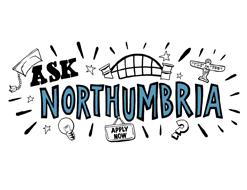-
Study
-
Quick Links
- Course Search
- Fees and Funding
- Unlock Your Potential
- Still time to Apply
- Higher and Degree Apprenticeships
- Continuing Professional Development
- Still time to apply
-
Undergraduate
- Application Guides
- UCAS Exhibitions
- Foundation Years
- School & College Outreach
- Information for Parents
-
Postgraduate
- Application Guide
- Postgraduate Research Degrees
- Flexible Learning
- Change Direction
- Register your Interest
-
-
International
International
Northumbria’s global footprint touches every continent across the world, through our global partnerships across 17 institutions in 10 countries, to our 277,000 strong alumni community and 150 recruitment partners – we prepare our students for the challenges of tomorrow. Discover more about how to join Northumbria’s global family or our partnerships.
View our Global Footprint-
Quick Links
- Course Search
- Undergraduate Study
- Postgraduate Study
- Information for Parents
- London Campus
- Northumbria Pathway
- Cost of Living
- Sign up for Information
-
International Students
- Information for Students
- International Events
- Application Guide
- Entry Requirements and Education Country Agents
- Global Offices
- English Requirements
- English Language Centre
- International student support
- Cost of Living
-
International Fees and Funding
- International Undergraduate Fees
- International Undergraduate Funding
- International Masters Fees
- International Masters Funding
- International Postgraduate Research Fees
- International Postgraduate Research Funding
-
International Partners
- Agent and Representative Network
- Global Partnerships
- Global Community
-
International Mobility
- Information for Northumbria Students
- Information for Incoming Exchange Students
-
-
Business
Business
The world is changing faster than ever before. The future is there to be won by organisations who find ways to turn today's possibilities into tomorrows competitive edge. In a connected world, collaboration can be the key to success.
More on our Business Services -
Research
Research
Northumbria is a research-rich, business-focused, professional university with a global reputation for academic quality. We conduct ground-breaking research that is responsive to the science & technology, health & well being, economic and social and arts & cultural needs for the communities
Discover more about our Research -
About Us
-
About Northumbria
- Our Strategy
- Our Staff
- Place and Partnerships
- Leadership & Governance
- Academic Departments
- University Services
- History of Northumbria
- Contact us
- Online Shop
-
-
Alumni
Alumni
Northumbria University is renowned for the calibre of its business-ready graduates. Our alumni network has over 246,000 graduates based in 178 countries worldwide in a range of sectors, our alumni are making a real impact on the world.
Our Alumni - Work For Us
What will I learn on this module?
On this module you will explore the unique possibilities for storytelling available in the audio medium. You will study a range of sample episodes from podcasts, exploring how audio creators can make use of the narrative techniques of both fiction and creative non-fiction. These might include more conventionally-structured audio essays (in the vein of This American Life), shows like Reply All and 99% Invisible which blend investigative journalism and cultural history, and more recent work – for instance, Moya Lothian-McLean's Human Resources which foregrounds the producer's personal response to her material. Sessions analysing the narrative structure and techniques of the set texts will be interspersed with lecture-style presentations from New Writing North which cover the landscape of the podcasting industry, and with hands-on practical sessions, in the studio and in the field, where you will learn to use recording equipment and editing software. You will deconstruct a podcast episode for your first assessment, and for your final assessment you will produce your own short scripted episode, alongside with a short commentary which situates your work within the broader context of the medium.
How will I learn on this module?
You will learn through weekly three-hour workshop-style seminars, individual tutorials, and independent learning. The first five weeks of seminars will introduce you to a wide range of podcast styles and approaches to the medium. You will also be introduced to relevant critical materials, which might include creators’ self-reflections and theoretical writings. You will discuss and analyse these examples in order to develop your understanding, and carry out writing activities in order to produce your own work which turns research into scripted narrative. After enhancement week you will spend three weeks learning studio techniques, supported by specialist staff from New Writing North, before returning to the classroom to workshop your episodes-in-development.
At Level 6 the main impetus of your work must come from you: independent writing and study will form the main learning activity, and you must conceive, plan and drive forward your own writing project for this module. It is your opportunity to design and execute your own piece of scripted audio content, putting into practice the techniques you have acquired on the degree so far. Your independent learning will be focused on reading and on producing, recording and editing your own piece of writing for audio which engages with the examples explored on the course. Tutorials will enable you to gain one-to-one tutor feedback and to talk to your tutor about the development of your work.
How will I be supported academically on this module?
Your learning will be academically supported by peer and tutor feedback on your work within seminars and workshops. We will help you engage with a range of podcast styles and provide exercises to help you produce your own piece of scripted/narrative audio content. Your tutor will support the development and realisation of your work towards the assessment, and provide one-to-one tutorial support.
The module handbook provides details of seminars, reading lists and assessment criteria; lecture PowerPoint slides are made available on the e-learning platform, together with links to relevant skills materials in the library.
The module tutor is available in seminars, as well as during office hours, to discuss any queries or concerns you have.
You are advised to see your Guidance Tutor at least twice each semester to review your academic progress. The Guidance Booklet, which you receive at the start of your first year, includes structured materials designed to help you develop your self-reflection skills. These materials underpin the academic side of the regular Guidance meetings, helping you to learn how to best use the feedback you receive on your assignments, how to build on your strengths, and improve in the areas where you could perform better.
What will I be expected to read on this module?
All modules at Northumbria include a range of reading materials that students are expected to engage with. The reading list for this module can be found at: http://readinglists.northumbria.ac.uk
(Reading List service online guide for academic staff this containing contact details for the Reading List team – http://library.northumbria.ac.uk/readinglists)
What will I be expected to achieve?
Knowledge & Understanding:
• Demonstrate an understanding of a range of narrative approaches in the audio medium
• Develop a practical awareness of the basic techniques of audio production and editing
Intellectual / Professional skills & abilities:
• Produce an effective piece of scripted audio content
• Situate your work within the contemporary podcasting landscape and its traditions
Personal Values Attributes (Global / Cultural awareness, Ethics, Curiosity) (PVA):
• Reflect critically on work of self and others
How will I be assessed?
Formative feedback is offered in individual 15 – 20 minute tutorials as well as through feedback in seminars and written feedback on draft materials. MLO 1, 2, 5
Summative
Assessment 1 (30% summative):
A critical report on a single podcast episode of your choice, analysing the choices made by the creator(s) in their presentation of the material. (500 words)
MLO 1, 5
Assessment 2 (70% summative):
A ten-minute episode of scripted/narrative audio content – submitted as an audio file and as the text script – accompanied by a 500-word commentary contextualising your work within the podcasting landscape as discussed on the course.
MLO 1, 2, 3, 4, 5
Feedback will be provided using the Departmental template and comments on the script.
Pre-requisite(s)
N/A
Co-requisite(s)
N/A
Module abstract
Over the past two decades, podcasts have become a central part of the media landscape, particularly for younger audiences. They are relatively easy to make and distribute with limited resources, but making an engaging scripted podcast requires a range of skills, which might include journalistic interviewing, audio editing, archival research, and the writerly techniques of creative non-fiction. On this module, by working in collaboration with New Writing North’s team and the Sounds Good Audiobooks project, you will have the unique opportunity to develop creative, critical, and production skills through dedicated industry input. You will learn to deconstruct individual podcast episodes from established and emerging creators, and you will produce a short scripted episode of your own which could serve as a calling card for your own creative voice and research interests.
Course info
UCAS Code QW38
Credits 20
Level of Study Undergraduate
Mode of Study 3 years Full Time or 4 years with a placement (sandwich)/study abroad
Department Humanities
Location City Campus, Northumbria University
City Newcastle
Start September 2025 or September 2026
All information is accurate at the time of sharing.
Full time Courses are primarily delivered via on-campus face to face learning but could include elements of online learning. Most courses run as planned and as promoted on our website and via our marketing materials, but if there are any substantial changes (as determined by the Competition and Markets Authority) to a course or there is the potential that course may be withdrawn, we will notify all affected applicants as soon as possible with advice and guidance regarding their options. It is also important to be aware that optional modules listed on course pages may be subject to change depending on uptake numbers each year.
Contact time is subject to increase or decrease in line with possible restrictions imposed by the government or the University in the interest of maintaining the health and safety and wellbeing of students, staff, and visitors if this is deemed necessary in future.
Useful Links
Find out about our distinctive approach at
www.northumbria.ac.uk/exp
Admissions Terms and Conditions
northumbria.ac.uk/terms
Fees and Funding
northumbria.ac.uk/fees
Admissions Policy
northumbria.ac.uk/adpolicy
Admissions Complaints Policy
northumbria.ac.uk/complaints













